必备英语特殊句式知识点(大全)
英语语法-特殊句式

Never have I been there . Little did I know about it . Seldom did she come late to school . Not a single mistake did he make . By no means should you buy that kind of car
• (3) 被强调部分的人称和数 • 被强调部分如果是原句的主语,who/that
后面的谓语在人称和数上应与原句主语保 持一致
• It was they that were talking and laughing. • 是他们在又说又笑的。
• (4)强调句指人和指物的情况 • 被强调部分指人时,It is (was)… 后用who(强调
• 2.So small were the words that he could hardly see them .
• 3.Such an interesting film was it that we were all deeply moved .
• 7. as引导的让步状语从句要用倒装语序 • n(不带冠词)/adj/ adv/ v+ as + subject + be/情态
He went to the film last night. So did I . You must finish your work, so must I . She is interested in the story, so am I . He didn’t turn up. Neither did his brother . His mother told him not to go to the film. So he
英语特殊句式归纳整理

英语特殊句式归纳整理用来表示说话人强烈的喜、怒、哀、乐等感情的句子,叫感叹句。
感叹句由what或how 引导,具体用法如下表:祈使句的基本用法祈使句是用来表示命令、请求、建议或劝告等的句子。
常省略主语,谓语动词用原形。
1. 肯定的祈使句①句型:动词原形+其他成分。
Be careful!小心!②"Do+祈使句"表示一种强烈的感情或请求,do起强调作用。
③please用在祈使句中可以表示一种客气的语气,但please用在句末时,必须用逗号与其余部分隔开。
Close the door, please. 请关门。
2. 否定的祈使句①常用句型:Don’t+动词原形+其他成分。
Don’t be late for school again! 别再迟到了!②用Never开头:Never+动词原形+其他成分。
Never leave today’s work for tomorrow! 不要把今天的工作留到明天!3. Let引导的祈使句以Let开头的句子也是祈使句,表示陈述和建议。
其否定形式有两种:Let...not或Don’t...Let us not be late. 让我们不要迟到。
Don’t let the boy play football in the street. 不要让这个男孩在街上踢足球。
祈使句与简单句、复合句之间的转换1. "Let’s + 动词原形+ 其他"可转换为"Shall we + 动词原形+ 其他? "。
Let’s go fishing this afternoon. =Shall we go fishing this afternoon?2. "祈使句+ and/or + 简单句"可转换为含if引导的条件状语从句的复合句。
Use your head, and you’ll find a way. =If you use your head, you’ll find a way. Hurry up, or we’ll be late. =If we don’t hurry up, we’ll be late.祈使句的应答语1. 以Let’s开头的祈使句,其答语常用Good idea. /OK. /Yes, I’d love to.等。
英语特殊句型结构大全

英语特殊句型结构大全1. 否定句型结构(Negative sentence structure)主语 + 动词 + not + 宾语(或补语)例如:I do not like coffee. (我不喜欢咖啡。
)2. 疑问句型结构(Question sentence structure)(1)一般疑问句助动词(be、do、have等)+ 主语 + 其他?例如:Are you happy? (你开心吗?)(2)特殊疑问句疑问词(what、where、when、why、who等)+ 助动词(be、do、have等)+ 主语 + 其他?例如:What are you eating? (你在吃什么?)3. 倒装句型结构(Inverted sentence structure)(1)全部倒装助动词、be动词或情态动词 + 主语 + 谓语动词(不带to)+ 其他?例如:Never have I seen such a beautiful sunset. (我从未见过如此美丽的日落。
)(2)部分倒装表示否定的词(hardly、never、seldom、not等)+ 谓语动词 + 主语 + 其他?例如:Seldom do I have time to read novels. (我很少有时间读小说。
)4. 强调句型结构(Emphatic sentence structure)主语 + 动词 + bet/fact/matter + 疑问词/that + 句子其他部分例如:It is not what you said, but the way you said it that hurt my feelings. (伤害我的是你说话的方式,而非你说的话。
)5. 假设句型结构(Conditional sentence structure)(1)真实条件句If/Unless + 现在时态,将来时态,一般过去时态,过去将来时态(虚拟语气)+ 主语 + 谓语例如:If it rains tomorrow, we will stay at home. (如果明天下雨,我们就呆在家里。
特殊句式知识点详解(初中英语专项复习)4
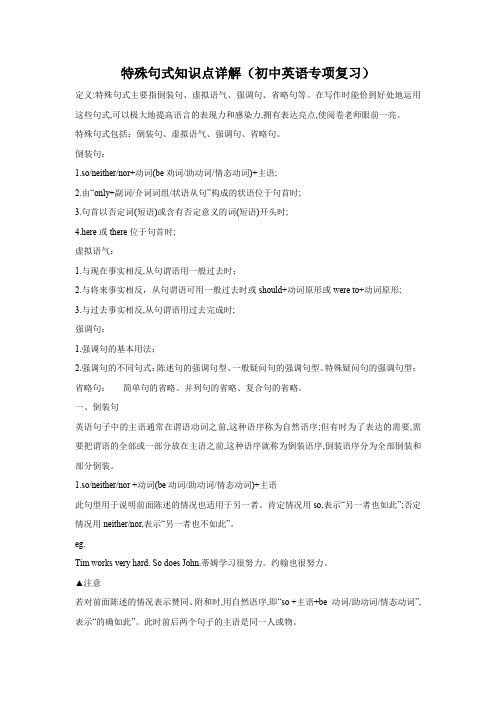
特殊句式知识点详解(初中英语专项复习)定义:特殊句式主要指倒装句、虚拟语气、强调句、省略句等。
在写作时能恰到好处地运用这些句式,可以极大地提高语言的表现力和感染力,拥有表达亮点,使阅卷老师眼前一亮。
特殊句式包括:倒装句、虚拟语气、强调句、省略句。
倒装句:1.so/neither/nor+动词(be劝词/助动词/情态动词)+主语;2.由“only+副词/介词词组/状语从句”构成的状语位于句首时;3.句首以否定词(短语)或含有否定意义的词(短语)开头时;4.here或there位于句首时;虚拟语气:1.与现在事实相反,从句谓语用一般过去时;2.与将来事实相反,从句谓语可用一般过去时或should+动词原形或were to+动词原形;3.与过去事实相反,从句谓语用过去完成时;强调句:1.强调句的基本用法;2.强调句的不同句式:陈述句的强调句型、一般疑问句的强调句型、特殊疑问句的强调句型;省略句:简单句的省略、并列句的省略、复合句的省略。
一、倒装句英语句子中的主语通常在谓语动词之前,这种语序称为自然语序;但有时为了表达的需要,需要把谓语的全部或一部分放在主语之前,这种语序就称为倒装语序,倒装语序分为全部倒装和部分倒装。
1.so/neither/nor +动词(be动词/助动词/情态动词)+主语此句型用于说明前面陈述的情况也适用于另一者。
肯定情况用so,表示“另一者也如此”;否定情况用neither/nor,表示“另一者也不如此”。
eg.Tim works very hard. So does John.蒂姆学习很努力。
约翰也很努力。
▲注意若对前面陈述的情况表示赞同、附和时,用自然语序,即“so +主语+be 动词/助动词/情态动词”,表示“的确如此”。
此时前后两个句子的主语是同一人或物。
eg .-She likes Chinese very much.他非常喜欢汉语。
-So she does.的确如此。
特殊句式课堂笔记

知识要点(三):特殊句式(倒装句,强调句,省略句)一.倒装句:1.完全倒装:时间,地点或者副词提前时,采用完全倒装。
(由本来的123语序变成321)Your turn comes now. —— Now comes your turn.The bus comes here. —— Here comes the bus.The boy rushed out. —— Out rushed the boy.*主语若为代词时,不参与倒装,语序为312:Out he rushed.2. 部分倒装(考试重点):即采用一般疑问句的语序。
1)否定词提前:never, seldom, rarely, little, hardly, scarcely, no sooner, no longer, nowhere,not only等。
He seldom goes out for dinner. ________________________________________________. He had no sooner gone to bed than his parents returned. ____________________________. *not…until…的倒装与上述略有不同:Not until+剩余部分+倒装句。
He didn’t tell me about that until I asked him to. ____________________________________.2)only+状语提前:We can solve the problem only in this way. ________________________________________.3) so+形/副提前:The weather was so hot that we had to stay at home. ________________________________. * so + be/助/情 +主:表示前面所说的肯定情况同样也适用于后者:You are young and _______________________ I.You like music and _______________________ I.If you can do it, __________________________ I.* 若前面用的是否定句,则用neither/nor来代替 soI don’t like sports and ______________________ she.* so + 主+ be/助/情:表示赞同某人说的,意思是“你说的没错。
【高考英语一轮复习】第四讲 特殊句式

第四讲 特殊句式特殊句式近五年仅仅考查过祈使句。
但特殊句式为构建复杂句式、分析长句提供了坚实保障。
备考把握以下内容:1.特殊句式包括:①强调句 ②倒装句 ③省略句 ④祈使句 ⑤感叹句 ⑥附加疑问句2.高考考查热点:①强调句中的it 和that ②特殊句式中的there be ③一些常用的固定表达结构一、完全倒装完全倒装是指将句子中的谓语动词全部置于主语之前。
此结构通常只用于一般现在时或一般过去时。
二、部分倒装部分倒装是指将谓语的一部分,如助动词或情态动词,置于主语之前。
如果句中的谓语部分不含有助动词或情态动词时,则需添加助动词do, does或did,并将其置于主语之前。
将下列句子变为倒装句①She didn’t have supper until her mother returned.→Not until her mother returned did__she__have__supper.②I hardly think it possible to finish the job before dark.→Hardly do__I__think__it__possible__to__finish__the__job__before__dark.③He learned the sad news only after the war.→Only after the war did__he__learn__the__sad__news.④He speaks English so clearly that he can always make himself understood.→So clearly does__he__speak__English__that__he__can__always__make__himself__understood.强调句型的基本结构单句语法填空/补全句子①It was when I got back to my apartment that I first came across my new neighbors.(天津卷单选改编)②It was only when the car pulled up in front of our house that__we saw Lily in thepassenger seat.(2018·天津卷单选改编)③It__was__not__until__midnight__that the noise of the street stopped.直到午夜,街上的嘈杂声才停止。
英语特殊句式知识点总结

英语特殊句式知识点总结1. Conditional SentencesConditional sentences are used to express a hypothetical situation and its potential outcome. There are four main types of conditional sentences in English, each with its own structure and usage.Zero Conditional: Used to express general truths or facts.Structure: If + present simple, present simpleExample: If you heat ice, it melts.First Conditional: Used to talk about possible future events and their likely outcomes. Structure: If + present simple, will + base formExample: If it rains, I will take an umbrella.Second Conditional: Used to talk about hypothetical or unlikely situations and their potential outcomes.Structure: If + past simple, would + base formExample: If I won the lottery, I would travel the world.Third Conditional: Used to talk about imaginary situations and their unrealized outcomes in the past.Structure: If + past perfect, would have + past participleExample: If she had studied harder, she would have passed the exam.2. Relative ClausesRelative clauses are used to provide additional information about a noun in a sentence. They are introduced by relative pronouns such as "who," "whom," "whose," "which," and "that." Relative clauses can be restrictive (essential to the understanding of the sentence) or non-restrictive (providing additional, non-essential information).Restrictive Relative Clause: Provides essential information about the noun and cannot be omitted without changing the meaning of the sentence.Example: The book that is on the table is mine.Non-Restrictive Relative Clause: Provides additional, non-essential information about the noun and is set off by commas.Example: My sister, who lives in New York, is a lawyer.3. Passive VoiceThe passive voice is used to emphasize the action performed on the subject rather than the subject performing the action. It is formed with the auxiliary verb "to be" followed by the past participle of the main verb.Structure: Subject + to be + past participle (by + agent)Example: The cake was baked by my mom.4. InversionInversion is a special sentence structure in which the usual order of subject and verb is reversed to emphasize an element in the sentence or to add variety to the writing. Subject-Verb Inversion: Used to emphasize the subject or to create a more formal tone. Example: Never have I seen such a beautiful sunset.Conditional Inversion: Used to create a more formal or poetic tone in conditional sentences. Example: Were I rich, I would buy a house by the beach.5. Cleft SentencesCleft sentences are used to emphasize a particular part of the sentence by placing it in a separate clause.It-cleft: Used to emphasize a particular element in the sentence.Structure: It + to be + emphasis + that/who/which + rest of the sentenceExample: It was the pizza that I enjoyed the most.Wh-cleft: Used to emphasize a particular element in the sentence using a wh-word. Structure: Wh-word + to be + emphasis + that/who/which + rest of the sentence Example: What she needs is a little encouragement.6. Emphatic StructureEmphatic structures are used to emphasize particular elements in the sentence by using auxiliary verbs or do-support.Do-Support Emphasis: Used to emphasize the main verb in the sentence.Example: I do love ice cream.Auxiliary Verb Emphasis: Used to emphasize the main verb by adding an auxiliary verb.Example: I can swim.7. Exclamatory SentencesExclamatory sentences are used to express strong emotions or feelings. They are characterized by the use of an exclamation mark and often begin with "What" or "How." What-a/How-a Clauses: Used to express surprise or admiration.Example: What a beautiful flower!How-adj Clauses: Used to express strong emotions.Example: How delicious the food is!In conclusion, understanding and using special sentence structures in English can enhance communication and add depth to the language. From conditional sentences to relative clauses, the passive voice, inversion, cleft sentences, emphatic structures, and exclamatory sentences, these special structures allow speakers and writers to convey meaning in a more nuanced and engaging manner. By mastering these structures, one can effectively express complex ideas and emotions while adding variety and depth to their language use.。
【英语】特殊句式知识点(大全)经典1
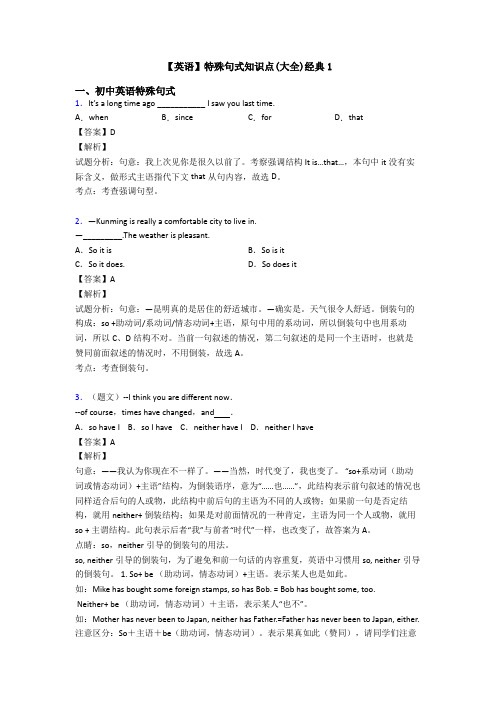
【英语】特殊句式知识点(大全)经典1一、初中英语特殊句式1.It’s a long time ago ___________ I saw you last time.A.when B.since C.for D.that【答案】D【解析】试题分析:句意:我上次见你是很久以前了。
考察强调结构It is…that…,本句中it没有实际含义,做形式主语指代下文that从句内容,故选D。
考点:考查强调句型。
2.—Kunming is really a comfortable city to live in.—_________.The weather is pleasant.A.So it is B.So is itC.So it does. D.So does it【答案】A【解析】试题分析:句意:—昆明真的是居住的舒适城市。
—确实是。
天气很令人舒适。
倒装句的构成:so +助动词/系动词/情态动词+主语,原句中用的系动词,所以倒装句中也用系动词,所以C、D结构不对。
当前一句叙述的情况,第二句叙述的是同一个主语时,也就是赞同前面叙述的情况时,不用倒装,故选A。
考点:考查倒装句。
3.(题文)--I think you are different now.--of course,times have changed,and .A.so have I B.so I have C.neither have I D.neither I have【答案】A【解析】句意:——我认为你现在不一样了。
——当然,时代变了,我也变了。
“so+系动词(助动词或情态动词)+主语”结构,为倒装语序,意为“……也……”,此结构表示前句叙述的情况也同样适合后句的人或物,此结构中前后句的主语为不同的人或物;如果前一句是否定结构,就用neither+ 倒装结构;如果是对前面情况的一种肯定,主语为同一个人或物,就用so + 主谓结构。
此句表示后者“我”与前者“时代”一样,也改变了,故答案为A。
高考英语语法专攻-《特殊句型》-考点归纳+针对性练习
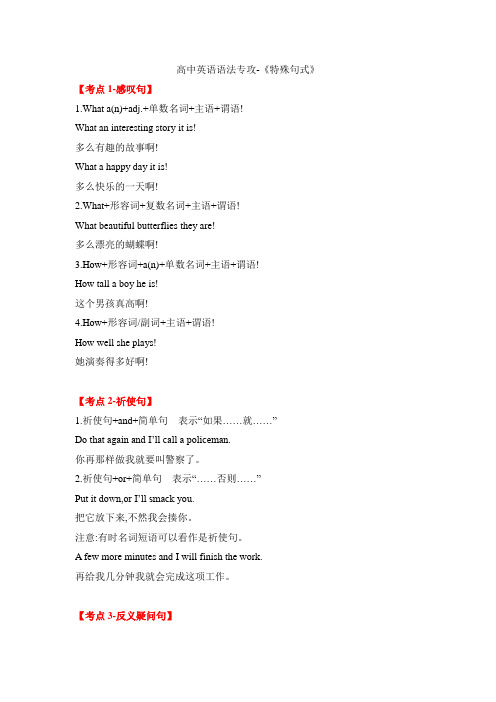
高中英语语法专攻-《特殊句式》【考点1-感叹句】1.What a(n)+adj.+单数名词+主语+谓语!What an interesting story it is!多么有趣的故事啊!What a happy day it is!多么快乐的一天啊!2.What+形容词+复数名词+主语+谓语!What beautiful butterflies they are!多么漂亮的蝴蝶啊!3.How+形容词+a(n)+单数名词+主语+谓语!How tall a boy he is!这个男孩真高啊!4.How+形容词/副词+主语+谓语!How well she plays!她演奏得多好啊!【考点2-祈使句】1.祈使句+and+简单句表示“如果……就……”Do that again and I’ll call a policeman.你再那样做我就要叫警察了。
2.祈使句+or+简单句表示“……否则……”Put it down,or I’ll smack you.把它放下来,不然我会揍你。
注意:有时名词短语可以看作是祈使句。
A few more minutes and I will finish the work.再给我几分钟我就会完成这项工作。
【考点3-反义疑问句】1.当陈述部分带有宾语从句时,反意疑问部分的主语与谓语常和主句保持一致。
He said that they would come to my birthday party,didn’t he?他说他们要来参加我的生日聚会,是吗?2.当陈述部分主句的谓语动词是think,believe,suppose,guess,expect,imagine,且主句主语为第一人称时,反意疑问部分的主语和谓语与宾语从句的主语和谓语保持一致;当陈述部分主句的主语为第二、三人称时,后面的疑问部分的主语和谓语与主句的主语和谓语保持一致。
They don’t believe he will succeed,do they?他们不相信他会成功,是吗?3.当陈述部分带有seldom,hardly,scarcely,never,few,little,nothing,nobody等否定词时,反意疑问部分用肯定形式。
特殊句式全归纳

语法复习专题10 特殊句式--- 倒装、强调、省略、感叹、反意及祈使句热点考向一倒装句1. 完全倒装(1) There be+主语+...,此结构中的be有时用stand/exist/lie/live/flow/seem等不及物动词代替。
There seems to be something wrong with the machine.(2) Here/There/Now/Then/Thus+不及物动词+名词There goes the bell.Let's go into the lecture hall.Be quick!Here comes the bus.(3) Out/In/Up/Down/Away/Off/Back/Over+不及物动词+名词Out rushed the children. Away flew the birds.比较:Away they hurried.(4) 介词短语(表地点)+不及物动词+主语On the wall hang two large portraits.At the foot of the hill lies a beautiful village.(5) 表语+连系动词+主语(表语可以是:形容词、介词短语、现在分词、过去分词)Present at the meeting were Professor White,Professor Smith and many other guests.Gone are the days when women were looked down upon.Seated in the first line are some advanced workers.(6) Such+be+主语Such are the facts;no one can deny them.Such is Yiyangqianxi, a young handsome singer popular with Chinese teenagers.2. 部分倒装(1) 用于以so,nor,neither开头的句子,表示重复前句的部分内容,须部分倒装,且此句的谓语应与前句的谓语在时态/形式上一致,但“so+主语+do”结构则表示对别人所说的情况加以肯定,它的主语与上文的主语相同,so相当于indeed,certainly。
高中英语语法:特殊句式
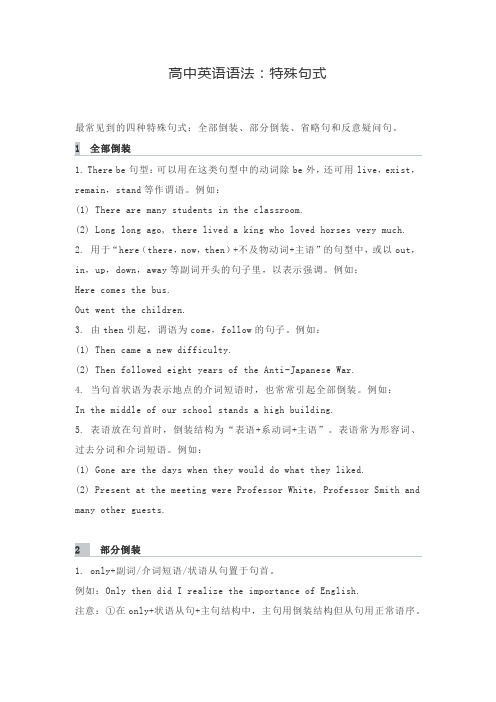
高中英语语法:特殊句式最常见到的四种特殊句式:全部倒装、部分倒装、省略句和反意疑问句。
1 全部倒装1. There be句型:可以用在这类句型中的动词除be外,还可用live,exist,remain,stand等作谓语。
例如:(1) There are many students in the classroom.(2) Long long ago, there lived a king who loved horses very much.2. 用于“here(there,now,then)+不及物动词+主语”的句型中,或以out,in,up,down,away等副词开头的句子里,以表示强调。
例如:Here comes the bus.Out went the children.3. 由then引起,谓语为come,follow的句子。
例如:(1) Then came a new difficulty.(2) Then followed eight years of the Anti-Japanese War.4. 当句首状语为表示地点的介词短语时,也常常引起全部倒装。
例如:In the middle of our school stands a high building.5. 表语放在句首时,倒装结构为“表语+系动词+主语”。
表语常为形容词、过去分词和介词短语。
例如:(1) Gone are the days when they would do what they liked.(2) Present at the meeting were Professor White, Professor Smith and many other guests.2 部分倒装1. only+副词/介词短语/状语从句置于句首。
例如:Only then did I realize the importance of English.注意:①在only+状语从句+主句结构中,主句用倒装结构但从句用正常语序。
英语特殊句式

A.which B.that
C.how D.when
解析:考查强调句型的用法。句意:影响我们生活的不是我们偶尔做什么,而是我们一贯做什么。强调部分是句子的主语,空格部分应是强调句型中的that,故选B项。
John talked with me for about an hour yesterday.Never had I heard him talk so much.
约翰昨天和我谈了约一个小时,在那之前,我从未听过他说那么多话。
By no means should you lose heart.你决不应该失去信心。
明天早点起床,如果不的话,你会错过早班车。
2.不定式省略,单独使用不定式符号to。
(1)用来代替动词不定式后被省略的动词,常在be afraid, be glad,forget,hope,intend,like,love,mean,prefer,refuse, seem,try,want,wish等的后边。
Dr.Smith,together with his wife and daughters,is going to visit Beijing this summer.(2009年高考陕西卷)
Dr.Smith将在今年夏天和妻子女儿们一起游览北京。
In my opinion,he rather than you,is to blame.
考点三 倒装句
1.完全倒装
(1)表示方式或方位的副词或介词短语,如here,there,now,then,up down,in,away,off,out,in the room,on the wall等,置于句首时,完全倒装。
Be quick!Here comes the bus.快点!公共汽车来了。
英语特殊句式语法

英语特殊句式语法一、概说英语语法中的特殊句式包括省略句、倒装句、强调句和虚拟语气等。
这些句式在英语中有着特殊的表达效果和意义,是英语语言的重要组成部分。
理解和掌握这些特殊句式,对于提高英语阅读、写作和口语表达能力至关重要。
二、省略句省略句是指在英语句子中,为了使语言更加简洁明了,省略掉某些成分的句子。
省略句可以是主语的省略、谓语的省略、宾语的省略等。
例如:It is raining heavily. (省略主语)The train leaves at 7:00. (省略谓语)I like reading books. (省略宾语)三、倒装句倒装句是指英语句子中的语序与常规语序相反,以强调某些词语或表达某种特殊意义。
倒装句可以分为全部倒装和部分倒装。
例如:Here comes the bus. (全部倒装)Only in this way can we solve the problem. (部分倒装)四、强调句强调句是为了突出某个词语或表达某种特殊意义而采用的一种句式。
强调句可以通过改变语序、使用强调词或使用强调结构来表达。
例如:It was he who found the solution to the problem. (使用强调词)It is on this issue that we need to focus our attention. (使用强调结构)五、虚拟语气虚拟语气是一种表示假设、想象或愿望的语气,与实际情况相反。
虚拟语气可以分为三种:与现在事实相反、与过去事实相反和与将来事实相反。
例如:If I were you, I would choose this option. (与现在事实相反)If he had known the answer, he would have given it to you. (与过去事实相反)If it were to rain tomorrow, we would cancel the picnic. (与将来事实相反)六、总结英语特殊句式语法是英语语言的重要组成部分,理解和掌握这些特殊句式对于提高英语阅读、写作和口语表达能力至关重要。
高考英语必备特殊句式大全(附高考英语常用词汇)
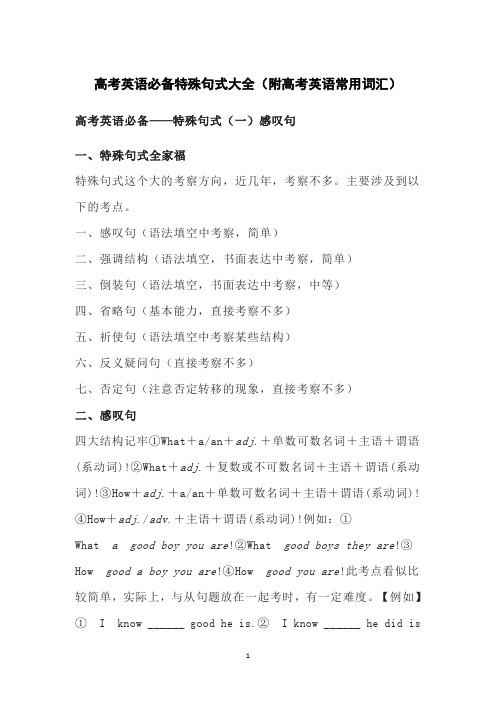
高考英语必备特殊句式大全(附高考英语常用词汇)高考英语必备——特殊句式(一)感叹句一、特殊句式全家福特殊句式这个大的考察方向,近几年,考察不多。
主要涉及到以下的考点。
一、感叹句(语法填空中考察,简单)二、强调结构(语法填空,书面表达中考察,简单)三、倒装句(语法填空,书面表达中考察,中等)四、省略句(基本能力,直接考察不多)五、祈使句(语法填空中考察某些结构)六、反义疑问句(直接考察不多)七、否定句(注意否定转移的现象,直接考察不多)二、感叹句四大结构记牢①What+a/an+adj.+单数可数名词+主语+谓语(系动词)!②What+adj.+复数或不可数名词+主语+谓语(系动词)!③How+adj.+a/an+单数可数名词+主语+谓语(系动词)!④How+adj./adv.+主语+谓语(系动词)!例如:①What a good boy you are!②What good boys they are!③How good a boy you are!④How good you are!此考点看似比较简单,实际上,与从句题放在一起考时,有一定难度。
【例如】①I know ______ good he is.②I know ______ he did isgood.在①中,答案为how,how good he is 是一个how 引导的感叹句;在②中,答案为what,what he did is good 是一个what引导的宾语从句问题来了,如何区分how,what引导的是感叹句还是从句呢?【答案】四个字,句!子!结!构!如宾语或者主语,或者表语;how引导的,其后是一个符合五大基本结构完整的句子。
【经典考察】(1)(2015年新课标卷Ⅱ)As natural architects, the Pueblo Indians figured out exactly ______(70) thick the adobe walls needed to be to make the cycle work on most days.【答案】how;how thick the adobe needed to be符合④How+adj./adv.+主语+谓语(系动词)!结构,故填how;(2)(2021年河南省天一联考)I recently spent a day in Hangzhou to see ______(65) easy it was to go cashless, and I found it somewhat ahead of other cities , including Beijing. I rode buses and subways, which all accept Alipay.【答案】how;how easy it is符合④How+adj./adv.+主语+谓语(系动词)! 结构,故填how;此外,初中的恶人搭配要记牢!how long;how soon;how far;how often;how many;how much【例】how long did he stay here?他在这里呆了多久How long is the river?这条河有多长?How often does he come here?他多久来这里一次?How soon will he be back?他多久之后会回来?How far is it from here to there?从这里到那里有多远。
英语特殊句式语法

英语特殊句式语法英语语法中存在一些特殊的句式结构,它们具有独特的语法规则和用法。
在本文中,我们将介绍一些常见的英语特殊句式,并通过示例来解释它们的用法。
一、倒装句倒装句是英语中常见的特殊句式之一,它采取了主语和谓语动词的位置颠倒。
倒装句的用法多种多样,下面是一些常见的情况:1. 完全倒装:当句子以表示地点状态的副词(如here, there, now, then等)开头时,需要完全倒装。
例如:Here comes the bus.There goes my hat.2. 部分倒装:在某些特定的条件下,主语和谓语动词的位置需要部分颠倒。
a. 在用于表示否定的副词或短语(如never, seldom, hardly, not until 等)开头的句子中,需要将助动词或情态动词与主语颠倒。
例如:Never have I seen such a beautiful sunset.Not until she left did I realize how much I loved her.b. 在以表示条件的状语从句(如if, unless, whether等)开头的句子中,需将助动词和主语颠倒。
例如:If only I had more time, I would travel around the world.Whether it rains or not, we will go camping.二、虚拟语气虚拟语气是英语中常见的特殊句式之一,用于表示与事实相反、假设或愿望等情况。
以下是虚拟语气的几种常见形式:1. 虚拟条件句:用于表示与事实相反的假设情况,包括类型1、类型2和类型3三种类型。
a. 类型1:表示真实可能发生的假设例如:If she studies hard, she will pass the exam.b. 类型2:表示与事实相反,但在理论上有可能实现的假设例如:If I were you, I would quit that job.c. 类型3:表示与过去事实相反的假设例如:If I had studied harder, I would have passed the exam.2. 虚拟表达愿望例如:I wish I could play the piano like a professional.3. 虚拟表达建议、命令等例如:The teacher suggested that they should review the material again.三、强调句强调句是一种特殊的句式,它通过强调句子中的某个成分来表达特殊的意义。
高中英语高考特殊句式知识点汇总(共五大类)

高考英语特殊句式汇总一、强调句型句型结构形式:It is/was…that/who…be的时态:that/who前面be的时态一般是一般现在时,当它后面的句子为过去时时,才用过去时。
判断方法:将(It is/was)...(that/who)…括号中的词同时去掉,看剩下的部分是否仍然成立。
若成立,则是强调句型;若不成立,则为状语从句、定语从句或主语从句。
They met the manager in the coffee shop the other day.*It was they that / who met the manager in the coffee shop the other day.*Was it they that / who met the manager in the coffee shop the other day?*Who was it that met the manager in the coffee shop the other day?*I wonder who it was that met the manager in the coffee shop the other day.*Can it be in the coffee shop where they once had a cup that they met the manager.* --- Who is making such noise downstairs?--- It is the children.二、祈使句祈使句的主语是you,但一般被省略;当前面有呼语时,一般得补出主语;否定式一般是在前面加Don’t,或是Never。
**在“祈使句,+ and/or/and then+句子”句型中,当祈使句中含有比较级时,可将祈使句中的谓语部分省略,只留下“比较级或比较级与名词,+and/or/and then+句子”。
特殊句式知识点总结

特殊句式知识点总结在英语写作中,句式的多样性是提高文章质量和表达效果的关键因素之一。
使用特殊句式可以丰富你的写作风格,增加语言的表现力。
本文将针对常见的特殊句式进行总结和讲解,帮助读者掌握不同的句式结构和用法,从而提高英语写作的水平。
一、倒装句1.完全倒装句主语和谓语动词的位置颠倒,常见于以下情况:- Here comes the bus.- Little did I know that she was watching.2. 部分倒装句只有助动词或情态动词与主语的位置颠倒,常见于以下情况:- Never have I seen such a beautiful sunset.- Not only does she play the piano well, but she also sings beautifully.3. 否定副词位于句首时的倒装在否定副词开头的句子中,主语和谓语动词颠倒,常见于以下情况:- Seldom have I seen him so angry.- Barely had I arrived when the phone started ringing.倒装句的使用可以增加句子的变化和灵活性,使句子更加生动、抓人,但需要注意的是,倒装句不能随意使用,要根据句子的语境和表达的意思来决定是否使用倒装句。
二、强调句强调句是通过强调句子的一部分来突出该部分的重要性,使信息更加突出。
英语中的强调句有两种形式:部分强调和完全强调。
1. 部分强调部分强调是通过在句中加入强调词来使该部分的信息得到突出:- It was John who broke the vase.- It's this book that I want to read.2. 完全强调完全强调是通过借助助动词do或情态动词will加上动词原形来实现强调:- It was he who broke the vase.- It is this book that I will read.强调句的使用可以使句子更加生动、突出重点,但使用时要注意强调的对象,避免造成句子表达的混淆或误解。
英语八大特殊句式

英语八大特殊句式英语八大特殊句式一、主句+not…until…句型not…until…句型是一个倒装句,意思是“直到……才……”,not是部分否定,表示强调。
例句:I didn't go home until midnight.直到半夜我才回家。
二、It+be+形容词+that…句型此句型是强调句型,能形象准确表达出句子的意思,使句子语气更加强烈。
例句:It was amazing that he finished the work in such a short time.令人惊讶的是他竟然用如此短的时间就完成了这项工作。
三、not…until+从句句型not…until+从句句型表示内容得以实现的时间,或是强调情况发生的先后,通常译为“直到……才……”。
例句:I didn't know the news until he told me.直到他告诉我我才知道这个消息。
四、No…without+名词/代词句型No…without…句型表示肯定的含义,意思是“没有……就没有……”,常用在客观事实上。
例句:No success without hard work.没有努力就没有成功。
五、little+比较级/最高级+than句型此句型在主句中有肯定含义,常用在客观事实上,表示“……比……稍微……”。
例句:I'm a little younger than he is.我比他稍微年轻一点。
六、It+be+形容词+of+sb.+to do sth.句型此句型是结构严谨、表达精准的句型,将句子的客观内容与主观评价紧密连接在一起。
例句:It was very kind of you to help me.你帮助我真的很好。
七、it+be+宾语+that从句句型此句型可以表达出主句的肯定和客观,把主句和从句有机地结合在一起,而从句又可以表达句子的主观意见。
例句:It is important that we protect the environment.我们保护环境很重要。
- 1、下载文档前请自行甄别文档内容的完整性,平台不提供额外的编辑、内容补充、找答案等附加服务。
- 2、"仅部分预览"的文档,不可在线预览部分如存在完整性等问题,可反馈申请退款(可完整预览的文档不适用该条件!)。
- 3、如文档侵犯您的权益,请联系客服反馈,我们会尽快为您处理(人工客服工作时间:9:00-18:30)。
13.—Hello! This is David. Can I speak to Tom? —Yes, ___________.
A.Tom is me B.This is Tom speaking.
C.I am Tom D.My name is Tom.
【答案】B
【解析】
试题分析:句意:-你好!我是大卫,我能和汤姆说话吗?-可以,我就是汤姆。很显然,两个人是在通话,在英语中,打电话有专用的自我介绍的方式。不是“I am…”而用“This is …”或者“This is …speaking.”故选B。
【考点定位】考查交际用语
14.一The pen writes well though it is only worth fifteen yuan.
一Let me have a try. So.
A.it is B.it does C.is it D.does it
【答案】B
【解析】句意:——那支钢笔写起来非常好,尽管它只值15元。——让我试试吧。的确是。So+主语+助动词,表示“的确,确实”;so+助动词+主语,表示“也”。根据Let me have atry.可知我尝试过后,认为对方说的对,故表示的确是,前一句的谓语writes,故此处代指这个动词用do的各种形式,主语it是第三人称单数,用助动词does,故为So it does。故选B。
8.—Wow. It is rather hot today. —Yes. ______ yesterday.
A.So it isB.So is itC.So was itD.So it was
【答案】C
【解析】
【详解】
C本题考查倒装句用法。句意:—哇。今天真热。—是的,昨天也热。A. So it is意为真的是,是一般现在时强调句;B. So is it意为天气真的热,是一般现在时倒装句;C. So was it意为昨天也是,是一般过去时倒装句;D. So it was意为昨天真的是热的,强调句。根据空格后的yesterday昨天,可知用一般过去时倒装句。故选C。
【考点定位】考查倒装句。
2.If you want to go to the mountains this evening, so ______ I.
A.do B.will C.am
【答案】B
【解析】
试题分析:句意:如果你今天晚上想去山上,我也去. so, neither位于分句或句子的开头,这种结构通常表示前面所说的情况也适合于另一个人(或事物),表示“我也这样”之类的概念。其句型可归纳为:so / neither + be / have /助动词/情态动词+主语。so, neither开头的倒装句一定要与上句的时态保持一致。so, neither开头的倒装句中的助动词或情态动词要根据人称的变化而变换。所以选B。
【答案】B
【解析】
考查介词短语的辨析。后面内容是对volunteering的解释,属于事实。因此用To be honest(说实话)。
12.— _______ honest boy!
—.
A.What an; So is he B.What a; So he is
C.how a; So is he D.What an; So he is
【解析】
试题分析:句意:――我喜欢空气中的气味:新鲜的草和甜甜的花香。――我也是,闻起来如此的美。肯定的陈述句后,跟so+主语+谓语,表示强调:确实……,其主语与前陈述句的主语相同;肯定的陈述句后,跟so+谓语+主语,……也……,其主语与前陈述句的主语不同。本句是另一个“我”说也喜欢,用倒装句,前句谓语动词是行为动词,用do的恰当形式代替,故选B。
必备英语特殊句式知识点(大全)
一、初中英语特殊句式
1.一I like the smell in the air—newly-cut grass and sweet flowers.
一.It smells so nice.
A.So I do B.So do I C.So am I D.So I am
【答案】B
【解析】
句意:-----我不清楚其他行星上是否有生物。------我也不清楚。whether---or not是固定搭配,表示不论是否,不管是…还是…;if不能和or not连用,如果用if需去掉or not;Me,too.意思是我也是,如果前面做某事,你和前面做相同的是,就用Me,too. Me neither表示前面的不是,我也不是。根据句意和语境可知选C。
【答案】C
【解析】
句意:---你哥哥在哪里?-----哦,他去图书馆了,露西也去了。1.have been to sp.表示去过某地,主语在说话人的地方,指从某个地方回来了,通常可与表示次数的状语连用;have gone to sp.表示到某地去了,没有回来,强调说话的当时去某地的人不在场,可能在去某个地方的路上,在去的那个地方,或回来的路上;have been in sp.意思是一直呆在某个地方。根据上文“Where's your brother?(你哥哥在哪里?)”结合语境可知“去图书馆”没有回来了,可知用has gone to sp.;2.so + be动词/助动词/情态动词+另一主语,此句型中需将主谓语倒装,表示前句所述的肯定情况也适用于另外一个人或物,例如,He is an English teacher. So am I.他是英语教师.我也是英语教师。so+主语+be动词/助动词/情态动词,此句型的主语与前一句的主语通常是指同一个“人或“物,.主谓语不需要倒装,这种句型表示说话者赞同前句所提到的情况或事实,例如,----He will go to England for his holiday tomorrow.他明天要去英国度假. ----So he will.的确如此。本句意思是露西也已经去了,故用So has Lucy;选C。
考点:考查宾语从句。
5.-I have an ipad and I put it to good use.
-____________.
A.So do I B.So am I
C.Neither do I D.Neither am I
【答案】A
【解析】
试题分析:句意:-我有一个ipad,我很好地利用它。so do I的意思是:我也这么做了。表示前面所说的情况同样适用于后面的人或物。助动词do也可以换成be动词,could,can,does,did等等。结构:so+V+I/she/he/we/they。Neither用于对否定情况的也适用,本题是肯定的情况,故用so;原句中的动词是have,所以V应是do。所以选A。
【解析】
试题分析:句意:我不喜欢动作电影,它们太吵了。我也不喜欢,我从不看动作电影。Neither+助动词/be动词/情态动词+主语,表示“也不……”,而Neither+助动词/be动词/情态动词+主语,表示“也……”,结合语境故选A。
考点:考查倒装句的用法。
4.— Could you let me knowyesterday?
7.---I’m not sure _____there are living things on other planets or not.
---_______.
A.whether, Me too.B.if, Me neither
C.whether, Me neitherD.if, Me too
【答案】C
点睛:当要表示前面提出的某一否定的情况也同样适合于后者,第二句的答语就用Neither/Nor+助动词/情态动词/be动词+主语;当要表示前面提出的某一肯定的情况也同样适合于后者,第二句的答语就用so+助动词/情态动词/be动词+主语。
— Because the traffic was heavy.
A.why did you come late B.why do you come late
C.why you came late D.why you come late
【答案】C
【解析】
试题分析:句意:—你能让我知道昨天你为什么来晚了吗?—因为交通拥挤。宾语从句用陈述句语序故排除AB;据rday故宾语从句用一般过去时态,故选C。
9.—I had a great time at Gina’s birthday party.
—________.
A.So was IB.So I doC.So did ID.So I am
【答案】C
【解析】
【详解】
句意:——我在吉娜的生日聚会上玩得很开心。——我也是。考查倒装句。so / neither / nor表示前面所说的情况也适合于后者,需用“so / neither / nor+助动词+主语”这样的倒装句式。前句had a great time是一般过去时,本句助动词需用did;根据句意结构,可知选C。
11., volunteering is both a chance to help others and a good way to develop ourselves.So you'd better make time to volunteer.
A.To my surpriseB.To be honestC.To start with
考点:考查简略句。
6.–I don’t understand the story in the new unit. What about you, Bill?
–_____.
A.Neither I do B.Neither do I C.So do I D.So I do
